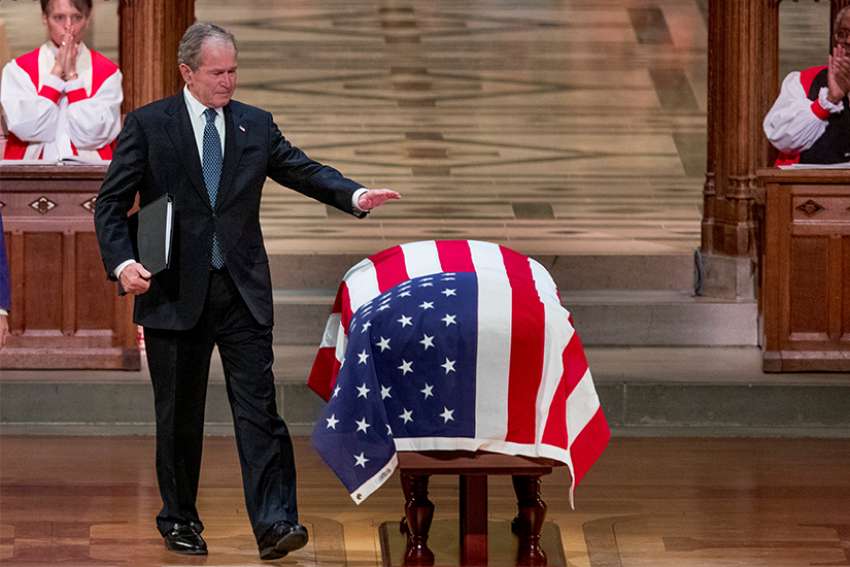Moments before the funeral, former presidents Jimmy Carter, Bill Clinton, Barack Obama, and their spouses, were seated in the front row.
Then the current president and his wife arrived, shortly before the Bush family and the flag-draped casket.
Each of the four eulogies honouring the 41st President of the United States underlined how George H.W. Bush presided amid hope and optimism, instead sowing fear and divisiveness.
The name of the current occupant of the White House was not mentioned by any of the four speakers, including former prime minister Brian Mulroney.
The first speaker was the brilliant writer and presidential historian Jon Meacham.
President Bush was one who “governed with virtues that most closely resembled those of Washington and of Adams, of TR and of FDR, of Truman and Eisenhower, of men who believed in causes larger than themselves,” Meacham said.
“A master of what Franklin Roosevelt called the science of human relationships,” Meacham said, “he believed that to whom much is given, much is expected. And because life gave him so much, he gave back again and again and again.”
The first Bush eulogy continued. “His life code, as he said, was tell the truth, don’t blame people. Be strong, do your best, try hard, forgive, stay the course. And that was and is the most American of creeds … for Lincoln and Bush both called on us to choose the right over the convenient, to hope rather than to fear, and to heed not our worst impulses, but our best instincts.”
The body language of the current president could not be mistaken. He was uncomfortable; scowling, squinty-eyed and sitting forward in his chair.
And then Brian Mulroney spoke eloquently about his good friend. Nearing the end, Mulroney made two points.
“President Bush’s decision to go forward with strong environmental legislation, including the Clean Air Act that resulted in an Acid Rain Accord with Canada, is a splendid gift to future generations of Americans and Canadians to savour in the air they breathe, the water they drink, the forests they enjoy, and the lakes, rivers and streams they cherish,” Mulroney said. (He didn’t need to mention the environmental protection rollbacks coming out of 1600 Pennsylvania Avenue these days.)
“There is a word for this: it is called leadership — and let me tell you that when George Bush was president of the United States of America, every single head of government in the world knew they were dealing with a true gentleman, a genuine leader — one who was distinguished, resolute and brave.”
Former presidents Obama, Clinton and Carter — all Democrats, not Republicans like Bush — were smiling at these words from a Canadian prime minister; the current president was not.
He did, however, look more comfortable when the next speaker, former U.S. Senator Alan Simpson, spoke. Simpson’s humour was adroit; but then he too talked about how his friend George H.W. Bush accepted a bipartisan agreement that would raise taxes and break his famous “read my lips” comment that he would not allow a tax hike.
The bipartisan Senate agreement supported by George H.W. Bush “went over to the House where his own party turned on him. Surely one of the main factors assuring his return to private life. But he often said ‘when the really tough choices come, it’s the country, not me. It’s not about Democrats or Republicans, it’s for our country’,” Simpson said.
“And he was a man of such great humility (and) those who travel the high road of humility in Washington, D.C., are not bothered by heavy traffic,” Simpson said to loud laughter.
“He never lost his sense of humour. Humour is the universal solvent against the abrasive elements of life. That’s what humour is. He never hated anyone. He knew what his mother and my mother always knew: hatred corrodes the container it’s carried in.”
George W. Bush, the 43rd president and son of the 41st, sat in the front row on the other side of the aisle from the other presidents. His was an exceptional eulogy: heartfelt, humorous and emotional.
The Bush family had been in a feud with the 45th president, but a truce was said to have been called so as to properly honour the 41st president. Though the son didn’t name anyone, one comment was particularly poignant.
“Of course, Dad taught me another special lesson. He showed me what it means to be a President who serves with integrity, leads with courage, and acts with love in his heart for the citizens of our country.”
It was definitely a funeral with a procession of contrasts.
(Brehl is a writer and author of many books.)


